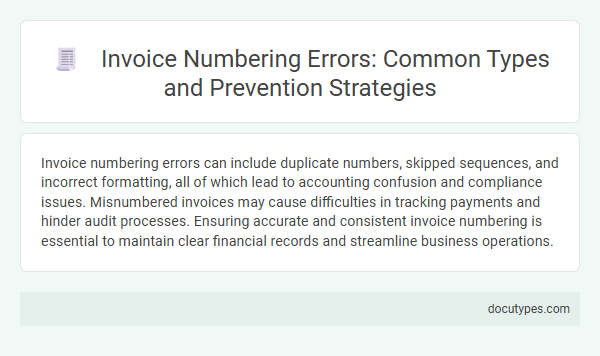Invoice numbering errors can include duplicate numbers, skipped sequences, and incorrect formatting, all of which lead to accounting confusion and compliance issues. Misnumbered invoices may cause difficulties in tracking payments and hinder audit processes. Ensuring accurate and consistent invoice numbering is essential to maintain clear financial records and streamline business operations.
Introduction to Invoice Numbering Errors
Invoice numbering is a critical aspect of financial record-keeping, ensuring each transaction is uniquely identified. Errors in this process can lead to confusion, duplicate entries, and compliance issues.
Common types of invoice numbering errors include skipped numbers, duplicate numbers, and incorrect sequencing. These mistakes can disrupt audit trails and complicate tax reporting. Understanding these errors helps businesses maintain accurate financial records and avoid penalties.
Importance of Accurate Invoice Numbering
Accurate invoice numbering is crucial for maintaining clear financial records and ensuring smooth business operations. Errors in invoice numbering can lead to confusion, delayed payments, and auditing issues.
- Duplicate Invoice Numbers - Occurs when the same number is assigned to multiple invoices, causing tracking difficulties and potential payment disputes.
- Skipped or Missing Numbers - Happens when invoice numbers are unintentionally omitted, leading to gaps that complicate audit trails and financial reconciliations.
- Incorrect Sequence - Involves numbering invoices out of chronological order, which can result in misunderstandings and compliance problems.
Maintaining accurate and sequential invoice numbering is essential to uphold financial integrity and streamline accounting processes.
Common Types of Invoice Numbering Errors
Invoice numbering errors can disrupt financial records and complicate audit processes. Common mistakes include duplicate numbers and skipped sequences.
You might also encounter alphanumeric inconsistencies or improper formatting. These errors create confusion and delay payment processing.
Duplicate Invoice Numbers
Duplicate invoice numbers occur when the same invoice identifier is assigned to more than one transaction, causing confusion in accounting records. This error can lead to difficulties in tracking payments, reconciling accounts, and maintaining accurate financial reports. Preventing duplicate invoice numbers requires implementing automated numbering systems and regular audits to ensure uniqueness and consistency.
Missing or Skipped Invoice Numbers
Missing or skipped invoice numbers are common errors in invoice numbering that can disrupt financial tracking. These gaps may cause confusion during audits and affect your accounting accuracy.
- Unintentional omission - Invoice numbers may be accidentally skipped due to manual entry errors or software glitches.
- System limitations - Certain accounting systems may not automatically detect missing invoice numbers, leading to unnoticed gaps.
- Misplaced invoices - Invoices could get lost or delayed, resulting in skipped numbers and incomplete records.
Out-of-Sequence Invoice Numbers
Out-of-sequence invoice numbers can create confusion in financial records and audit trails. These errors disrupt the chronological order essential for accurate invoice tracking.
- Missing Invoice Numbers - Skipping numbers in a sequence leads to gaps that complicate reconciliations and may suggest lost or fraudulent documents.
- Duplicate Numbers - Repeating invoice numbers causes overlap in records, making it difficult to distinguish individual transactions.
- Incorrect Date Alignment - Invoice numbers that do not correspond with their issuance dates hinder chronological sorting and may raise compliance issues.
Manual Entry Mistakes in Invoice Numbers
Manual entry mistakes in invoice numbers commonly include typographical errors such as transposing digits or omitting characters. These errors can lead to duplicate or missing invoice numbers, causing confusion in financial records.
Incorrect invoice numbering disrupts the tracking of transactions and delays payment processing. Implementing automated systems reduces the risk of manual input errors, ensuring invoice number accuracy and consistency.
Consequences of Invoice Numbering Errors
| Type of Invoice Numbering Error | Description | Consequences |
|---|---|---|
| Duplicate Invoice Numbers | Assigning the same invoice number to multiple transactions. | Leads to confusion in record-keeping, difficulties in payment tracking, and potential disputes with clients or vendors. |
| Skipped or Missing Invoice Numbers | Omitting a number or sequence in the invoice numbering system. | Raises suspicion of invoice manipulation or fraud, complicates audits, and disrupts financial reporting accuracy. |
| Non-Sequential Numbering | Issuing invoices out of the expected sequential order. | Causes challenges in tracking transactions and verifying the completeness of accounting records. |
| Incorrect Formatting | Using inconsistent formats or characters in invoice numbers. | Results in processing delays, system errors, and difficulties integrating with accounting or ERP systems. |
| Manual Entry Errors | Human mistakes during manual invoice number input. | Leads to misapplication of payments, delayed collections, and increased administrative workload. |
Prevention Strategies for Invoice Numbering Errors
Invoice numbering errors can include duplication, missing numbers, and inconsistent formats, leading to accounting confusion and compliance issues. Implementing automated numbering systems with validation checks ensures sequential and unique invoice identifiers. Regular audits and employee training further reduce the risk of errors in invoice numbering processes.
What Types of Errors Can Occur in Invoice Numbering? Infographic

